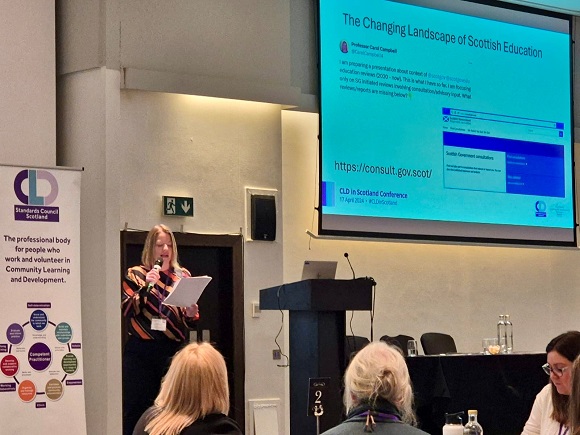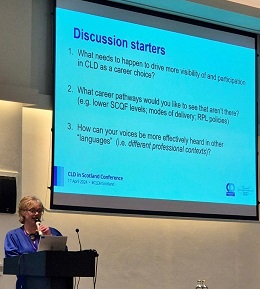What do you get when you take 120 CLD leaders, 12 amazing speakers, 1 central Glasgow venue and throw in a bucket load of passion, enthusiasm and critical thinking? The “CLD in Scotland Conference” of course!
On 17th April, CLD Standards Council and CLD Managers Scotland jointly hosted the CLD in Scotland Conference. It aimed to bring key stakeholders in the CLD sector together to consider strategic issues affecting CLD in Scotland and to consider how these issues should be addressed by the review of CLD.
To get us thinking, we were joined by an array of speakers from across the academic, economic and education spheres.
Some of the key messages they shared and questions they posed include:
CLD in Context – Dr Rachel Shanks, University of Aberdeen
- Connecting Freire, Kahneman, Fielding
- Cognitive bias, and intuitive unconscious bias decision
- Individual agency and self-awareness to become agents of change
Delivering Positive Outcomes – Professor Sinead Gormally, University of Glasgow
- How do we increase the visibility and recognition of CLD as a sector, whilst still supporting each of our 3 domains of practice and specialist roles?
- If we are to deliver positive outcomes – what then is our (CLD’s) unique role and contribution to the Scotland we want? And how do we evidence and articulate this?

CLD: Ready for the Future – Pauline Radcliffe, Scottish Credit and Qualifications Framework Partnership

- Recognising real learning’s worth – and where that happens
- How can your voices be more effectively heard in other “languages” (i.e. different professional contexts)?
Capturing the Impact of CLD – Professor Emeritas Karen MacArdle, Sue Briggs and Kirsty Forrester
- What can we do about Social Justice? Counter hegemony with critical education for us and them; Sharpen up our language and speak truth to power; Amplify and interpret voice and stories; Be political/change driven.
- What are the key outcomes against which we wish to be assessed, known, measured?
Scotland’s Labour Market and the Role of CLD – Chris Brodie, Skills Development Scotland
- Scotland has a shrinking labour pool. Prioritising investment in skills through data and insight-led decision making will be increasingly important for people and the economy!
- What opportunities and challenges to these labour market conditions present for the CLD sector itself?
You can see the social media feedback by clicking on the #CLDinScotland hashtag.
Conference slides and resources will be available on i-develop soon.
